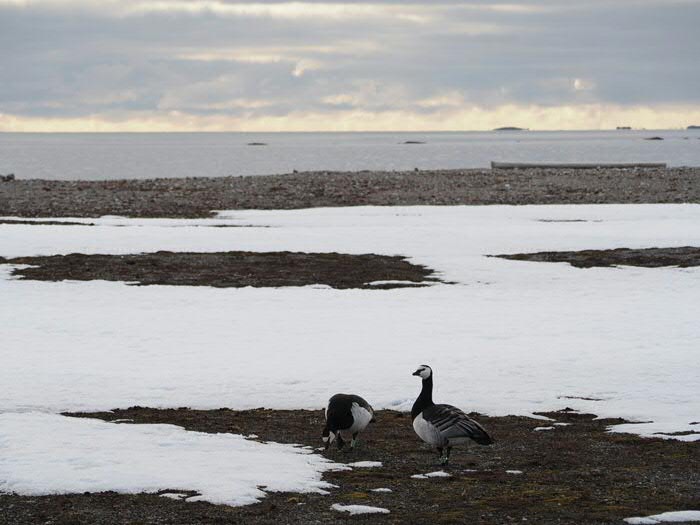Dutch barnacle geese have a more active immune system than the same species elsewhere in the North
Bird migration is an impressive phenomenon, but why birds often travel huge distances to and from their breeding grounds in the far North is still very unclear. Suggestions include that the birds profit from longer daylight hours, or that there are fewer predators. Researchers from the University of Groningen and the NIOO-KNAW Vogeltrekstation, the Dutch centre for bird migration and demographics, have discovered a new explanation.
They investigated barnacle geese breeding on Spitsbergen and compared them with birds of the same species that did not migrate but stayed in the Netherlands all year round.

Invest less in immune system
The birds on Spitsbergen appear to invest much less energy in their immune systems, particularly the part responsible for general resistance to disease. The researchers suspect that this might be because there are far fewer pathogens in the North than here in the Netherlands.
More energy available for reproduction
By investing less in their immune systems, the birds have more energy available for reproduction and changing their plumage. The birds that breed in the Netherlands do not have this luxury. In order to defend themselves against pathogens like bird flu, their immune systems work about four times as hard during the entire summer than those of the same species in the North. Thus birds appear able to adjust their immune systems according to the risk of catching a disease.
More information
Voor meer informatie kunt u contact opnemen met Cecilia A. M. Sandström; email: c.a.m.sandstrom rug.nl; tel: 0655976246
Article:
Baseline immune activity is associated with date rather than with moult stage in the Arctic-breeding barnacle goose (Branta leucopsis)
PLOS ONE: http://dx.plos.org/10.1371/journal.pone.0114812
Autors:
Cecilia A. M. Sandström ab, Jouke Propa, Henk van der Jeugd c, Maarten J. J. E. Loonen a
a University of Groningen, Arctic Centre, PO Box 716, 9700 AS Groningen, the Netherlands
b University of Groningen, Ocean Ecosystems, Nijenborgh 7, 9747 AG Groningen, the Netherlands
c Vogeltrekstation - Dutch Centre for Avian Migration and Demography (NIOO-KNAW), PO Box 50, 6700 AB Wageningen, the Netherlands
More news
-
16 December 2025
How AI can help people with language impairments find their speech
-
18 November 2025
What about the wife beater? How language reinforces harmful ideas
-
03 November 2025
Menopause in perspective: How the media influences our perception
